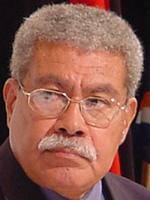Qarase’s Philosophy supported the 2000 coup

Every government rides on a philosophy that guides its policies and programmes. It is this that is used to attract voters in a multi-party parliamentary democracy. Furthermore the attractiveness of the ruling political party and direction that government takes sits on the shoulders of the party leader who also becomes the PM.
In Fiji, just like the 1990s belonged to Rabuka, the 2000s belonged to Laisenia Qarase. His philosophy differed markedly in that he was not going to waste time with political horse-trading as did Rabuka. He was not worried about popularity; there was a job to do and only he (and his backers) knew his agenda.
After all, Qarase rose from the ranks of Fiji’s crumbling bureaucracy post-1987 and moved through FHL and FDB before entering Senate as an SVT nominee. His term in Senate was marked by anti-Indian outbursts that were often bitter. His philosophy however, became clearer after he was handpicked by suddenly-prominent power-brokers during the 2000 coup.
It is important to note that at that time, the power balance was very much on the side of the coup camp as they appeared to be calling all the shots. At a fateful FHL Board meeting in 2000 when Speight was still pushing Adi Samanunu Talakuli for PM, according to Commodore Bainimarama, Qarase was part of a group of six politicians including nationalist Apisai Tora, who proposed removing Ratu Josefa Iloilo from the presidency so long as he retained his hold on PM. Iloilo was being harassed by the rebels to support Speight’s candidate at the time.
On 28 August 2005, Qarase expressed shock at this revelation saying, "I have never been part of any discussions to oust the president, and to suggest that I was part of any discussions is unbelievable." On 2 September, Police Commissioner Andrew Hughes promised to interview Qarase, but this never transpired. Interestingly, the Peter Foster dossier, that prompted this series on greed, alleges that Hughes had a different more insidious agenda.
It has to be noted here that Qarase’s very first pronouncements after becoming interim-PM was to accuse foreign governments of having a simplistic understanding of the 2000 coup. This was after the Commonwealth Secretariat gave Fiji a deadline to return to Parliamentary democracy in accordance with the Harare Declaration and consistent with the Millbrook Action program.
Qarase instead, proposed to stay in power and draft a new 1990-type racist constitution over a period of 3 years. “The Chandrika Prasad case put an end to these sectarian aspirations and forced Qarase to comply with Fiji’s Commonwealth obligations by restoring the 1997 constitution” (CCF report). This is the same Qarase who is now championing the 1997 constitution and the importance of democracy in Fiji.
At the Commonwealth Parliamentary Association meeting in Nadi on 29 August 2005, Qarase said that while Fiji "accepted" western-style democracy, it was an alien concept and certain aspects of it clashed with Fijian traditions. He thus perpetuated a persistent confusion in Fiji’s search for democracy by championing the traditional system of governance despite being a commoner PM.
This was later criticized by Ratu Epeli Ganilau, who said that Qarase was misleading the public and "( ) should answer whether he wants the western system of governance which allows him to be Prime Minister, or the Fijian tradition which requires the chiefs to rule by virtue of their birthright and rank."
While still on the topic of Qarase and democracy, one cannot be allowed to overlook the fact that
Qarase’s 2000 promise to introduce a new ethno-nationalist Constitution continued to surface in the SDL Election manifesto throughout his reign. In fact on a visit to NZ, Qarase intimated to PM Helen Clark that democracy was not going to work in Fiji. And the NZPM had nothing to say! Qarase’s anti-democracy stance did not end there.
Qarase Supported 2000 Coup
There is little dispute that Qarase supported the 2000 coup like many who said they supported the objectives, but not the means used by Speight. His involvement however, must have been deeper because of the significance of the Fijian Holdings Ltd. boardroom in decision-making at the time, Qarase’s close links with FHL, and the fact that he became PM.
In fact this was an unarticulated misgiving that Commodore Bainimarama appeared to have during the crisis of 2000 when he supported Qarase against Adi Samanunu and then asked him not to court any of the coup-tainted in his government when he took over the reins of PM on 4th July 2000. Qarase ignored this and defiantly surrounded himself with the stars of 2000.
Later he tried to pardon the coup-makers legally via the Reconciliation Unity and Tolerance Bill. Then on June 3, 2005 Qarase’s sympathies were clearly seen when he appeared to offer an apology for the perpetrators of the coup by declaring in parliament, “those responsible for the overthrow of the Indo-Fijian-led government in 2000 were responding to the Tagi in Taukei, or cry of the Fijian people”. Race was being used to justify illegality; that was Qarase.
A Racist PM
It is not clear whether Qarase ever had a political philosophy because his utterances were always steeped in exclusiveness for Fijians and disregard for Indo-Fijians. In the Senate, his nominees like Senators Mitieli Bulanauca, Asesela Ravuvu, Apisai Tora and Rev Tomasi Kanailagi continued to make racist, homophobic and bigoted statements throughout their tenure.
In parliament, some of his 2000 coup-spawned new stars were the biggest racists when it came to parliamentary contributions. Adi Asenaca Caucau thundered on 30th July 2002 that Fiji’s Indians were like co or wild grass growing everywhere and “taking up the space of others”. Ted Young called Kamlesh Arya, “Ponga Pundit”, in a foul attempt to denigrate the Hindu priest.
Simione Kaitani, who beat the courts on his involvement in the 2000 coup despite virtually living in the parliamentary complex at the time, never hesitated to make barbed comments against Chaudhry being the “cause” of the 2000 coup. He also spearheaded a malicious propaganda campaign against the President Ratu Mara, Qarase’s own traditional chief.
None of these racist undemocratic disrupters was ever reprimanded by Qarase. Perhaps they really were better at articulating his evolving philosophy as he focused on sanctioning programs that allowed for personal plunder in the name of “Fijian assistance”. Strange that he was actually showing military savvy; diversionary tactics they call it!
Subhash Appana is an academic and political commentator. The opinions contained in this article are entirely his and not necessarily shared by any organizations he may be associated with both in Fiji and abroad. Email subhasha@ais.ac.nz



